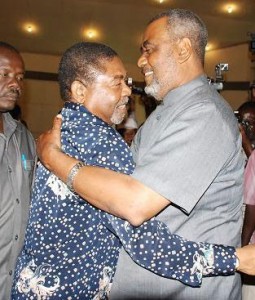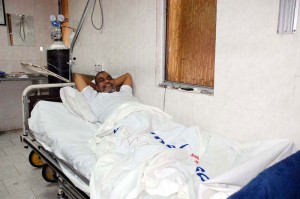As this issue of Tanzanian Affairs goes to press the country is gripped by election fever. At stake in the elections scheduled for October 31 2010 are the presidency and vice-presidency of the United Republic, the presidency of Zanzibar, hundreds of seats in the National Assembly and the Zanzibar House of Representatives, and thousands of seats for local councillors.
It is hoped that next issue of Tanzanian Affairs will contain an account of the final stages of the election campaigns and a summary of the results.
Changes
Since the last elections in 2005 there have been a number of changes in organisation and procedures in the ruling Chama cha Mapinduzi (CCM) party aimed a making them more open and democratic. For example, the Party, which has ruled the country for almost 49 years, and has always ensured a tight control over selection of party election candidates by its Central and National Executive Committees (CC and NEC), has relaxed its grip this time. Candidates voted in by the people at primary elections have been approved by the party hierarchy in most cases. However, the earlier tight control, with its nationwide network of party cells and its quite remarkable – almost unique – skill in squelching any individual or group wanting to deviate from the party line, has given Tanzania years of unity and peace which must be the envy of troubled neighbouring countries.
However, with the passage of time, people are beginning to reveal their discontent with the status quo and are beginning to protest more vigorously than they have before so that some election meetings this time had to be cancelled midway and candidates have been verbally attacked on a far greater scale than before. This has made for very lively election meetings.
Efforts have been made also to reduce the rampant corruption evident in elections in the past. It has become a tradition for candidates, more numerous than ever this time, desperate to retain or gain power, to distribute money or other bribes to voters. This time however they found officers of the Prevention and Combating of Corruption Bureau (PCCB) at most of the primary election centres. Some were shocked to find themselves being arrested as they tried secretly to hand out bribes to voters.
THE MAIN CANDIDATES
THE UNITED REPUBLIC – presidential candidates:
CCM – President Jakaya Kikwete for a second term.
– For Vice President – Dr Ghalib Bilal.
CHADEMA – Dr Wilbroad Slaa.
– For Vice President – Saidi Mzee Saidi.
CUF – Professor Ibrahim Lipumba.
– For Vice-President – Juma Duni Haji.
There are a number of candidates from smaller parties also running.
ZANZIBAR – presidential candidates
CCM – Presidency: Dr Ali Mohammed Shein.
CUF – Presidency: Seif Shariff Hamad.
Candidates from seven parties qualified for the Isles’ presidency and most are likely to stand in the election. They are the representatives of CUF, CCM, NCCR, TADEA, NRA, AFP and Jahazi Asilia.
Dividing power
An example of the skill with which the CCM party hierarchy controlled and distributed power amongst the top candidates in the elections was seen in the selection for the top positions – the presidency and vice-presidency of the United Republic (one of whom must come from the Isles) and the presidency of Zanzibar.
For the Tanzanian presidential candidate only two candidates submitted their names and one subsequently withdrew. The party then chose President Kikwete for a second term, virtually unanimously.
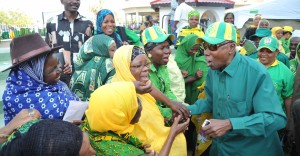
Dr Ghalib Bilal (right) greets CCM supporters at the start of the campaign
For the two top posts in Zanzibar it was more competitive as eight leaders submitted their names. Among them were Chief Minister Shamsi Nahodha, former Chief Minister Dr Ghalib Bilal, Ambassador Ally Karume and Minister Ally Juma Shamhuna. After much speculation in the press, the final decision of the party’s NEC came as a surprise to many. It was important that Pembans, who normally vote overwhelmingly against the CCM, should be well represented, so the current Vice-President of Tanzania, Dr Ali Mohamed Shein, a Pemban, got the nomination for the presidency of Zanzibar. The Swahili media gave the impression that he was chosen because he has been working well with President Kikwete for the last five years and would be a ‘safe pair of hands’ in any future disputes between the mainland and the Isles.
It was also important for prominent political leader Dr Ghalib Bilal, who had tried for the presidency before, to be given a top job. He therefore became the candidate for the vice-presidency of Tanzania. The choice of Dr Bilal was politically astute as former Zanzibar President Salmin Amour, who retains much influence in the Isles, was said to prefer him. It ensured that he and his many followers would remain loyal to the central government.
The Zanzibar referendum
This Zanzibar election will be different from the previous three, the results of which were widely questioned, as, in a referendum held just before the election campaigns began, the people of Zanzibar voted in favour of an agreement between the two main parties under which, whatever the result, the next government would be a coalition.
In the referendum all 18 constituencies in Pemba voted ‘yes’ but in Unguja 8 out of 32 constituencies voted ‘no.’ In total 188,705 voted in favour of the proposal, while 95,613 rejected it. Zanzibar Electoral Commission (ZEC) Chairman Khatib Mwinyichande announced the results at Bwawani centre to cheers of “Ndiyo! Ndiyo! Ndiyo!” (Yes! Yes! Yes!) from a big crowd that had waited for the outcome for several hours.
In addition to the discussions on the referendum the Zanzibar House of Assembly debated a constitutional amendment to give Zanzibar the status of a state which was contested initially because it was thought to be a violation of the Constitution of the United Republic.
The amendment read: ‘Zanzibar is a state whose boundaries include the islands of Unguja and Pemba, formerly known as the People’s Republic of Zanzibar.’ All the 75 MP’s from both CCM and CUF voted for this amendment. This cleared the way for the Isles to have a government of national unity to end the long standing political antagonism between the two parties.
A power-sharing government will be formed after the October elections, and will include the President from the wining party, a First-Vice President from the second-placed party and a Second Vice-President from the wining party. The Second-Vice President will be the leader of government business in the House of Representatives. The cabinet will comprise ministers from all political parties depending on the number of seats their party wins in the elections. The post of Chief Minister is to be abolished in the new set-up – Guardian
The opposition fails again
The 18 opposition parties have once again failed to take advantage of an increasing pressure from voters for change. Instead they have devoted a large part of their energy and resources to fighting each other instead of combining to fight against the monolithic ruling party.
Of the opposition parties only two are of real significance – The Chama cha Maendeleo (CHADEMA) because of its growing influence on the mainland and the Civic United Front (CUF) which, in previous elections in Zanzibar, has run neck and neck with the ruling CCM party.
Although CHADEMA agreed not to oppose CUF in the elections for the presidency of Zanzibar there was little or no sign of reciprocity by CUF on the mainland.
The policies
Traditionally, Tanzanian elections are based largely on the character of the individual rather than on party policy. But examination of the early speeches in the campaign gave an indication of some policy differences.
PRESIDENT KIKWETE AND CCM
Readers of Tanzanian Affairs will be familiar with the major policies of the ruling party and these are unlikely to change in the future. They include preservation of law and order including protection of the Albinos, encouragement of foreign investment, pursuit of those alleged to be involved in corruption, continued expenditure on social services and improvements in health and education.
The current president began his campaign by addressing five rallies a day, using two helicopters. His speeches were carefully adjusted for each audience and the promises for the future were numerous. Less frequent were explanations on how these promises would be paid for. – Habari Leo.
DR SLAA AND CHADEMA
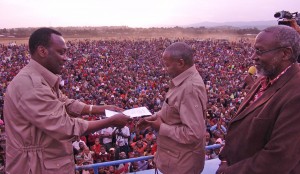
CHADEMA chairman Freeman Mbowe (left) hands the presidential candidate forms to Dr Wilbroad Slaa (centre) at a rally in Karatu. Right is Prof Mwesiga Baregu, chairman of the campaign committee (source Yahya Charahani).
Dr Wilbroad Slaa has 15 years of experience as CHADEMA MP for Karatu. He became well known for putting out a ‘list of shame’ in 2007 naming allegedly corrupt ministers and key party officials, which prompted a series of legal threats against him by those accused. Despite vows that they would sue him for defamation, none of them went to court and the ‘list of shame’ was deemed accurate, earning Dr Slaa credibility as an anti-graft crusader in a country where corruption is said to eat up a third of the nation’s annual $9.0 billion budget.
Dr Slaa told thousands of chanting CHADEMA supporters at the launch of his party’s campaign that, if elected, he would, during his first 100 days in power, mainly focus on restoring accountability, integrity and trust within the government. He said his administration would not tolerate corruption, embezzlement of public funds and misuse of the country’s natural resources. Dr Slaa said Tanzania was poor and underdeveloped largely due to poor leadership and weak policies and the plunder of natural resources such as minerals and wildlife. “Under my leadership, the issue of corruption will be history…we will take tough measures against corrupt leaders…. We will not tolerate the plunder of our natural resources by the so-called foreign investors, who instead of revamping privatised entities turn them into mere godowns,” he said. He went on to say that implementation of the 2010 CHADEMA manifesto, which has been dubbed “Hatudanganyiki” (We will not be cheated), was the surest way to deal with these shortcomings.
His manifesto focuses on ensuring quality social services, such as education, water and health for all Tanzanians. His administration would offer free education from Standard One to Form Six and he would revamp agriculture, establish a robust industrial base, create better paying jobs, enhance security and develop sports and culture. Again, it was difficult to detect how these would be paid for.
He said that that government expenditure was excessive and disproportionate (President Kikwete had squandered Shs 23 billion on refurbishing State House). He promised to start by trimming his own salary if elected. Payments of allowances and salaries would have to be cut back by 20% starting with the President and regional commissioners.
Parliamentary and senior officials’ salaries would be slashed by 15%. Slaa pledged to expand the tax base while doing away with the rampant tax exemptions. He pledged to ban official posh cars, and reform the land law. He promised to remove taxes on construction materials to enable Tanzanians in rural and urban areas to build decent houses – Majira.
Whether by coincidence or not, the CCM party has nominated a person known as Willbard Slaa to vie for Dr Wilbroad Slaa’s parliamentary constituency, Karatu, in the Arusha region. CHADEMA fears that this may confuse some voters who in the past 15 years have been used to the name ‘Slaa’ as their MP.
Postscript: It is said that Dr Slaa did not want to take on the virtually impossible task of trying to unseat President Kikwete because it would mean that he would lose his safe parliamentary seat. The Swahili press has been alleging that, in agreeing to be persuaded by his Chairman, Freeman Mbowe, who wanted to stand for Parliament rather than try for the presidency, Slaa insisted that CHADEMA should pay him funds equivalent to what he would have earned as an MP over five years.
PROFESSOR LIPUMBA AND CUF
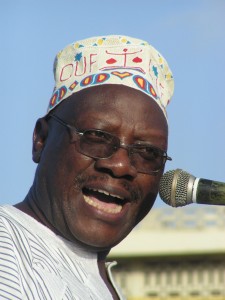
Professor Lipumba
Professor Ibrahim Lipumba, who has attempted three times unsuccessfully to become the country’s president, has spent many years as a lecturer in economics at the University of Dar es Salaam.
He said the country was at a crossroads and needed new leadership. Shs 11 trillion had disappeared since President Kikwete entered office in 2005. “This is equivalent to the total government budget this year….When he took power he promised to deal with corruption but what happened had been delusion and deception. The real culprits have gone free while those taken to court were facing diluted charges which eventually might be dropped.” He cited examples of the soaring cost of living and presented his elections manifesto, promising a new constitution and a government of national unity. He also challenged Kikwete to have a live debate so that people could decide how to vote. The President refused. Significantly, to put fears at rest, he said that he would strengthen the Union between Zanzibar and the mainland – Mwananchi.
THE Civic United Front (CUF) has nominated 120 candidates from the Mainland and 50 from the Isles to vie for Union parliamentary seats. It has also nominated 50 others from the Isles to contest seats in the Zanzibar House of Representatives.
CUF National Chairman Lipumba said that his party had invited CCM members who lost in the election primaries wishing to join CUF but added that there would be no automatic nominations for various leadership positions in the party.
He claimed that he cherished the idea of an alliance among the opposition parties, saying it was the best approach to challenge the ruling party more strongly, but insisted that he (Prof Lipumba) was the best candidate for the union president with a vision for change. However, he wished Dr Wilbroad Slaa all the best in his bid for the presidency.
Several ministers and over 70 former MP’s lose
MP’s unsuccessful in the primaries included Minister for East African Affairs Dr Deodorus Kamala (Nkenge), Deputy Minister for Fisheries and Livestock Development James Wanyancha , Deputy Minister for Health and Social Welfare Dr Aisha Kigoda, Deputy Minister for Education and Vocational Training Mwantumu Mahiza, Deputy Minister for Natural Resources and Tourism Shamsa Mwangunga and Deputy Minister for Information, Culture and Sports Joel Bendera (Korogwe Urban). Former Planning Minister Dr Juma Ngasongwa (Ulanga West) also lost.
Other prominent MP’s who lost included Joseph Mungai (Mufindi North), Dr Ibrahim Msabaha (Kibaha Rural) Prof Philemon Sarungi (Rorya), John Shibuda (Maswa), Felix Mrema ( Arusha Urban), William Shelukindo (Bumbuli), – Guardian on Sunday.
Some ten CCM MP’s said to have ‘ganged up’ against prominent CHADEMA MP Zitto Kabwe (Kigoma South) and caused his suspension from parliament in 2007, have been defeated in the CCM primaries. They spoke vehemently against a private motion that was tabled by Kabwe on an issue at Buzwagi gold mine and demanded that he be punished. Subsequently, Kabwe was suspended but not before he cursed them, predicting that they would not be returned in 2010. Kabwe’s prophesy seems to have been fulfilled and now he has the last laugh – Tanzania Daima.
Four ministers returned unopposed
Four cabinet ministers, including Prime Minister Mizengo Pinda, the Foreign Affairs and International Cooperation Minister, the Minister for Water Prof. Mark Mwandosya and Ms Celina Kombani, Minister of State in the Prime Minister’s Office, have been returned to parliament unopposed. Altogether CCM is starting off the elections with a lead of 13 unopposed MPs. Opposition parties have protested in some cases – Habari Leo.
A few of the hundreds of election ‘incidents’
The PCCB held a CHADEMA candidate over an alleged Euro 1,000 bribe in Musoma. Again, there were many similar cases – Nipashe.
CCM Secretary General Yusuf Makamba said that CHADEMA’s presidential candidate Wilbroad Slaa could not be trusted to respect the presidential oath of office while he failed to stand by the oath he took as a priest. Makamba said: “He took the oath of obedience and chastity but he broke it. He got married and then divorced his wife and now he goes around introducing his fiancée at rallies. How can he be trusted to run the country?” – Habari Leo.
CCM (as also the Chief Justice) condemned CHADEMA for bringing up at an election rally the case of the Shs 133 billion embezzlement from the External Payment Arrears (EPA) account in the Bank of Tanzania (BoT). Kikwete’s campaign manager said that CCM was not responsible but certain individuals were. “The matter was sub-judice and so it should not have been raised at the rally” he said – Mwananchi
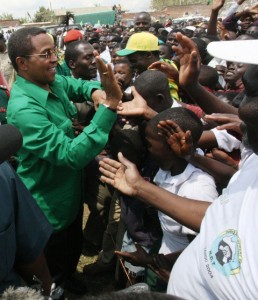
President Kikwete greets crowds in Mbeya. Photo Freddy Maro
In Tunduma, Presidential candidate Jakaya Kikwete had a difficult time while addressing a rally when the people indicated that they would vote for him but not vote for his CCM candidate as MP. After speaking for 15 minutes Kikwete had to cut short his speech and even the party’s musical troupe (TOT) could not calm the noisy crowd and had to stop playing. Other similar incidents have occurred at other places – Majira
CUF suffered a blow in its one time stronghold in the Lake Zone – Bukoba Urban Constituency – when its local leader and former CUF MP Lwakatare defected to CHADEMA in 2008. CUF admitted that they were facing difficulties due to what they described as foul play by CHADEMA youths and leaders. “These leaders are doing all they can to tarnish CUF’s image and are provoking us to react negatively” said a spokesman. The ‘Daily News’ reported the flags of CHADEMA flying near CUF’s flags in several places and at one CUF branch, CHADEMA placards were placed on the wall of a house flying CUF’s flag. A CHADEMA spokesman said: “Akili ni nywele, kila mtu ana zake” loosely meaning everyone has their own way of doing things.
CUF speakers have pointed out that Tanzania was in the bottom ten percent of the world’s economies in terms of per capita income, with an estimated Gross Domestic Product of $22.1 billion or $550 per capita.
John Malecela
The most spectacular casualty in the CCM primaries was veteran CCM statesman and former Prime Minister and High Commissioner in London, John Malecela, who was defeated at Mtera by a young and upcoming politician called Livingstone Lusinde. The NEC sustained Lusinde’s victory after former President Ali Hassan Mwinyi was reported to have asked NEC members to uphold the primary results.
CCM candidates queried
Several CCM candidates are facing objections on grounds of nationality or forgery of documents and CHADEMA and CUF have filed objections – Habari Leo.
Private candidates
The government has won again in its determination not to allow independent candidates to stand for election. The Court of Appeal has ruled that the private candidates issue can only be settled by parliament which has jurisdiction to amend the constitution.
Registration of CCJ delayed
The Minister of State in the Prime Minister’s Office, Philip Marmo has said that the party set up four months earlier to oppose CCM, the CCJ, would not get permanent registration before the October elections because the Registrar of Parties had no funds to carry out the process of verifying CCJ membership, as required by law. The CCJ is one of six parties waiting to be registered – Tanzania Daima.
Mkullo – “I am a citizen”
Finance Minister Mustafa Mkullo, who is standing for the Kilwa seat in parliament, said he was surprised by allegations by some elders that he was a citizen of Malawi. “If I am really a foreigner, how come they didn’t question my nationality in 2005? I am confident because I was born in Kimamba and raised in Kilosa,” he declared. He had emerged winner in the primaries with 6,000 votes – Nipashe.
Impartiality
The Tanzania Media Council (MCT) has issued a statement condemning media outlets that are used as agents of political parties, calling upon journalists to stop wearing party colours and to stick to professional ethics. MCT Executive Secretary Kajubi Mukajanga said it was unprofessional for reporters to display political slogans while covering party campaigns. They should also stop being biased in their reports and make sure that all political parties got fair coverage. Journalists are not supposed to be more Catholic than the Pope while reporting elections,” he said – Mwananchi.
